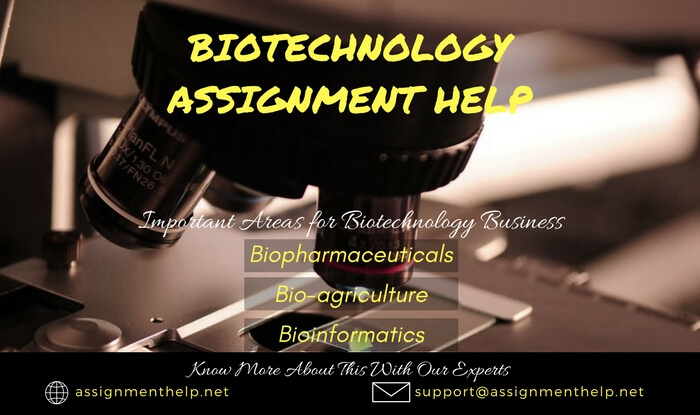Biotechnology Assignment Help
Biotechnology Introduction:
The term Biotechnology is made up of two words Biology and Technology. It is a technique to use biological agents or their components for generating products, services useful for human beings. But it covers very wide area and technique involved is divergent. It is very difficult to give precise definition of the subject. Some standard definitions of biotechnology are given below.
1. Biotechnology consists of "the control use of biological agents such as microorganisms or cellular components for beneficial use.":-U.S. Natural Science Federation
2. Biotechnology is "the integrated use of biochemistry, microbiology, and engineering sciences in order to achieve technological application of the capabilities of microorganism, cultured tissues/cells and parts thereof.":- European Federation of Biotechnology
 These different definitions of biotechnology differ in their approach, content and emphasis. But used the biological agents or their component and obtaining of products or services, both features are common in all definition.
These different definitions of biotechnology differ in their approach, content and emphasis. But used the biological agents or their component and obtaining of products or services, both features are common in all definition.
History Of Biotechnology
Although term biotechnology originated recently, but humans employed microorganisms about 7000 year back for obtaining wine, vinegar, curd, leaven bread etc. Some of these processes are very common in our kitchen work; we have a slight hesitation to refer them as biotechnology. All these processes that are totally based on capabilities of microorganisms are known as old biotechnological processes.

Chronology of Important Developments in biotechnology:
- Yeast used to make wine and bear before 6000 BC
- Large scale production of acetone, butanol and glycerol using bacteria 1912-1914
- Large scale production of penicillin 1944
- Use of monoclonal antibodies for diagnosis 1981
- Commercial cultivation of transgenic crops 1996
Biotechnology Assignment Help By Online Tutoring and Guided Sessions from AssignmentHelp.Net
Time to time human has work on
- Important of natural capabilities of microorganisms;
- Make to be capable of novel processes, and
- Discovering micro-organisms novel capabilities.
All the above goal have led to the development of Recombinant DNA Technology, which includes modification of micro-organisms and other micro-organisms for make the highly valuable, novel and naturally nonexistent capabilities. For example, the human gene producing insulin has been transferred and expressed in bacteria E. coli; the insulin produced by these genetically engineered microbe is being used in the management of diabetes. The animal, plant cells and their components are also be used to generate valuable products. Crop varieties and animal breeds with entirely new and highly useful traits can be created with the help of Recombinant DNA Technology. These examples constitute the new biotechnology.
Scope and Importance
The biotechnology may be applied in four broad areas like industrial area including health care, crop production and agriculture, non food uses of crops and other products and environmental uses. For the protection of human health, production of monoclonal antibodies, DNA and RNA probes, artificial vaccines, human interferon, and insulin etc., these are included in medical biotechnology.
Production of useful compounds like ethanol, lactic acid, glycerine, critic and acid enzymes, Single Cell Proteins (CSP) from bacteria, yeast, fungi or algae for human food and animal feed etc., these are include in industrial biotechnology.
Production of transgenic animals for increased milk, growth rate, resistance to disease, test tube babies; involves in vitro fertilization, embryo transfer etc. are included in animal biotechnology.
The efficient sewage treatment, deodorization of human excreta, degradation of petroleum and management of oil spills, detoxification of wastes and industrial effluents with the help of micro-organisms and bio control plant diseases, insect pests by using viruses, bacteria, fungi, amoeba etc., these are included in environmental biotechnology.
The embryo culture, to recover haploid plants from inter-specific hybrid, clone multiplication through meristem culture, germplasm conservation through storage in liquid nitrogen, isolation of somaclonal variant with improved yield traits and gene transfer for insect resistance, protection against viruses, herbicide resistance, storage protein improvement etc., these are include in plant biotechnology.
Commercial potential:
Biotechnology has an unlimited commercial potential in the view its capability to generate unlimited range of valuable and useful product with every aspect of human existence. For example, in the mid 1991, over 130 biotechnologically derived pharmaceuticles, aimed at everything from hemophilia to AIDS, and from anaemia to leukaemia, were under to regulatory review in the United States.
The important areas for biotechnology business are as follows:
- Biopharmaceuticals (vaccines, therapeutics, diagnostics)
- Bio-agriculture (transgenic varieties, bio-fertilizers, bio pesticides)
- Bioinformatics
- Bio-industry and
- Bio-services (research and development, clinical trials, manufacturing on contact)


